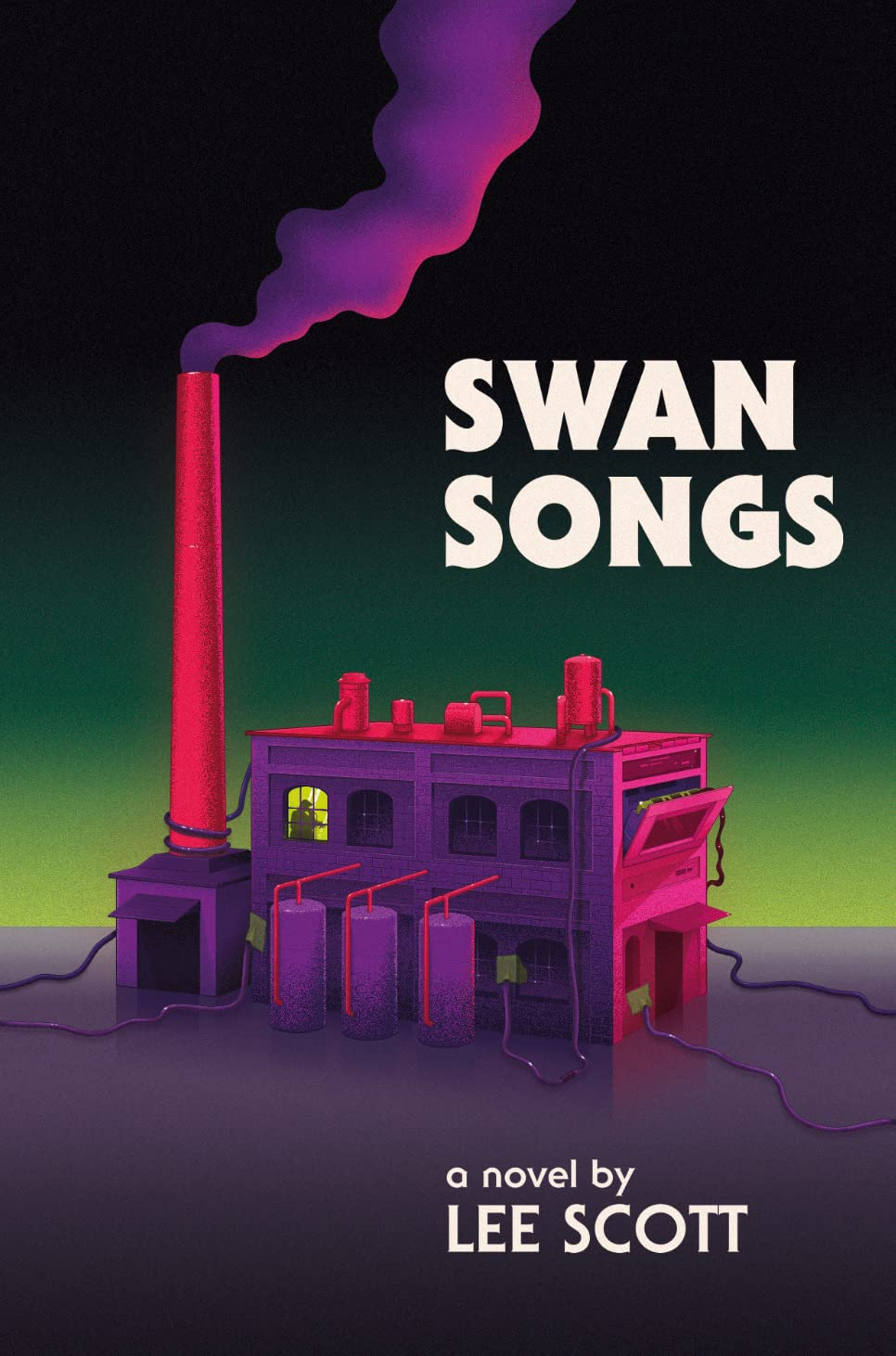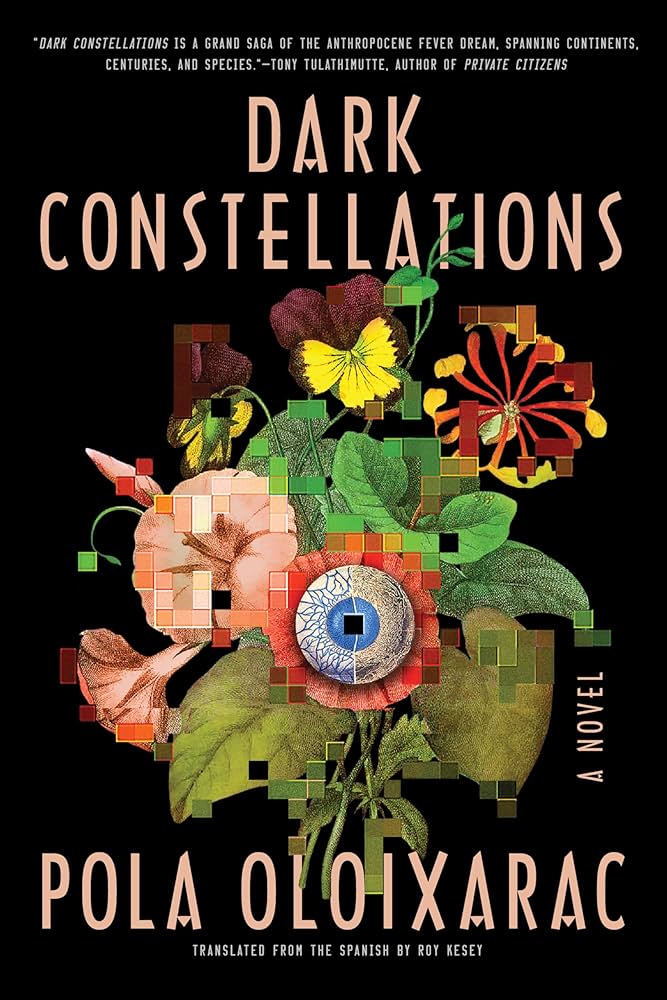Written by Alex Veregan
Lee Scott’s debut novel Swan Songs (2021) opens in Church Town, a place where ‘the men work in factories and the women go to college to become beauticians… and then work in factories’. Even the workers of the town’s two local recruitment agencies eventually find themselves ‘confused onto the production lines of the same factories’, an ignominious outcome for those who dared ‘to think on the cusp of the outer centre of the box’. We learn that one such recruitment agent, Garry (or Pete), was so distraught to learn of his new vocation that he walked home and up the stairs, dove headfirst through the window, and shattered into a thousand pieces before being swept into a dustpan by his wife.

The factories, where workers ‘pick things up and put them down for twelve hours’, appear as inevitable destinations for Church Town’s inhabitants: even the aspiring beauticians and recruitment agents cannot avoid them forever. Neither can the novel’s hero, Leonard Swanson, who must put his ambitions of creating ‘the greatest and only rap album Church Town has ever produced’ on hold when the Jobcentre advisors force him to sign up to a recruitment agency. Swanson not only finds work on the floor of a factory owned by GENPHARM but discovers that its true purpose is to manufacture the lifeblood for a race of ‘blurry-faced green creatures’ that only he can see.
In John Carpenter’s They Live (1988), a film referenced multiple times throughout Swan Songs, the protagonist, Nada, discovers a pair of sunglasses which reveal that aliens live among humanity and keep humans living lives of uncritical production and consumption through subliminal capitalist messaging. Understandably, the aliens’ presence is countered by a popular resistance movement, culminating in a climactic attack on the spaceport where Nada heroically destroys the transmitter which had been sending the signals enslaving humanity. In Swan Songs, when Swanson discovers the existence of the blurry-faced green creatures whom he had unknowingly been working to feed throughout his entire time at GENPHARM, he quits to continue working on his rap album.

If Swanson’s reaction seems understated, it is because the reality of life as described by Scott is made no more oppressive by the revelation that it is being overseen by a clandestine group of aliens. Swanson recalls his colleague Denise chiding him to get back to work, and reasons that the nature of factory work precluded him from ever stopping: ‘As you well know, providing the machine is still spitting out vials, we can’t ever stop, Denise!’ In The Technological Society, Jacques Ellul writes that ‘the machine tends not only to create a new human environment, but also to modify man’s very essence… He must adapt himself, as though the world were new, to a universe for which he was not created’. This aligns with Scott’s depiction of GENPHARM, where the arrhythmic shift patterns and monotonous labour result in Swanson’s physical and mental degradation: his ‘body set to auto-sigh’.
Whether real or hallucinatory, we can understand Swanson’s visions and encounters with the aliens as a result of his refusal to rationalise the world he lives in. He recalls watching a video of GENPHARM’s owner, Rich Bestard VII, thanking Chris for his work as ‘a line-picker for three hundred years’. Swanson wonders why nobody else acknowledged that Bestard was ‘a green blurry-faced bastard’, but reasons that Chris ‘was very happy with Rich Bestard’s acknowledgement and that’s what matters I guess’. Chris and Denise have faith in the GENPHARM hierarchy, and believe their work is valuable and necessary. As Ellul writes, ‘man creates for himself a new religion of a rational and technical order to justify his work and be justified in it’. Swanson can see Bestard for the alien that he may or may not be because he does not share his co-workers’ faith in the order of things.
Scott, then, uses the absurdity of the alien conspiracy to highlight the absurdity of Swanson’s, and our, reality. Building on the work of Bertolt Brecht, Herbert Marcuse writes that the ‘estrangement-effect’ is ‘literature’s own answer to the threat of total behaviourism – the attempt to rescue the rationality of the negative’, enabling the audience to recognise the world ‘as what it is’. Swanson quits his job upon discovering the factory’s true purpose, but the source of his consternation, he thinks, is ‘the fact I had succumbed to working for someone else’. Swanson’s feelings of alienation long predate the discovery which prompts both him and the reader to re-evaluate his situation. The toll of factory work on his health and sanity is no more objectionable for the fact that it has been caused by blurry-faced green creatures, but their apparent existence undermines the ideology which rationalises such work as necessary or even desirable to Swanson’s co-workers.
Later in the text, we learn more about who these creatures are and how they operate. Swanson learns these things by accident; his primary concern is scamming the Jobcentre so that he can find a place to stay in London. When a hostel worker named Mike ushers Swanson into a secret room, he reveals two things: the elite aliens can buy space in humans’ heads and eventually annex the bodies for themselves, a process Swanson is currently experiencing; and that most aliens are no longer societal elites. Having succumbed to the ‘allure of alcohol and other such delights’, they are more likely to be found, Mike explains, ‘down here at the bottom with you and me… You know, scrubbing up the shit and that!’ Even the aliens, then, find themselves ensnared by that pervasive unfreedom which Marcuse identifies as being ‘perpetuated and intensified in the form of many liberties and comforts’.
Toward the end of the novel, Swanson confronts the alien trying to annex his body: Rich Bestard VIII, heir to the GENPHARM fortune and Leonard Swanson superfan. Swanson takes away Bestard’s vibris, the alien technology which had allowed him to enter Swanson’s head, and decides to enact his revenge upon the would-be body snatcher: selling him a rap verse and stopping 4 bars short of the usual 16. He then uses the earnings to rent a flat in London from which he can continue his Jobcentre scam. Swanson’s rebellion against Bestard and the ‘insidious Jobcentre advisors’ appears less like the violent revolution depicted in the climax of They Live, and more like the infrapolitics of resistance identified by James C. Scott: ‘It is in this no-man’s-land of feints, small attacks, probing to find weaknesses, and not in the rare frontal assault, that the ordinary battlefield lies’. Swanson is a hero of this ordinary battlefield, daily waging a personal war against the forces of unfreedom that would have him pick things up and put them down for twelve hours a day instead of sitting around and smoking weed.
By the close of the novel, Leonard Swanson has neither produced a revolution nor a classic rap album: the world is the same as before. Perhaps the greatest lesson Swan Songs has to teach us is that if ‘blurry-faced green bastards’ did suddenly appear with a plan to secretly control every aspect of our lives, we couldn’t really tell the difference anyway.
Bibliography
Herbert Marcuse, One-Dimensional Man: Studies in the Ideology of Advanced Industrial Society, (London: Routledge, 1991) Jacques Ellul, The Technological Society, (New York: Vintage Books, 1964) James C. Scott, Domination and the Arts of Resistance: Hidden Transcripts, (New Haven: Yale
University Press, 2008) Lee Scott, Swan Songs, (London: Repeater Books, 2021)




